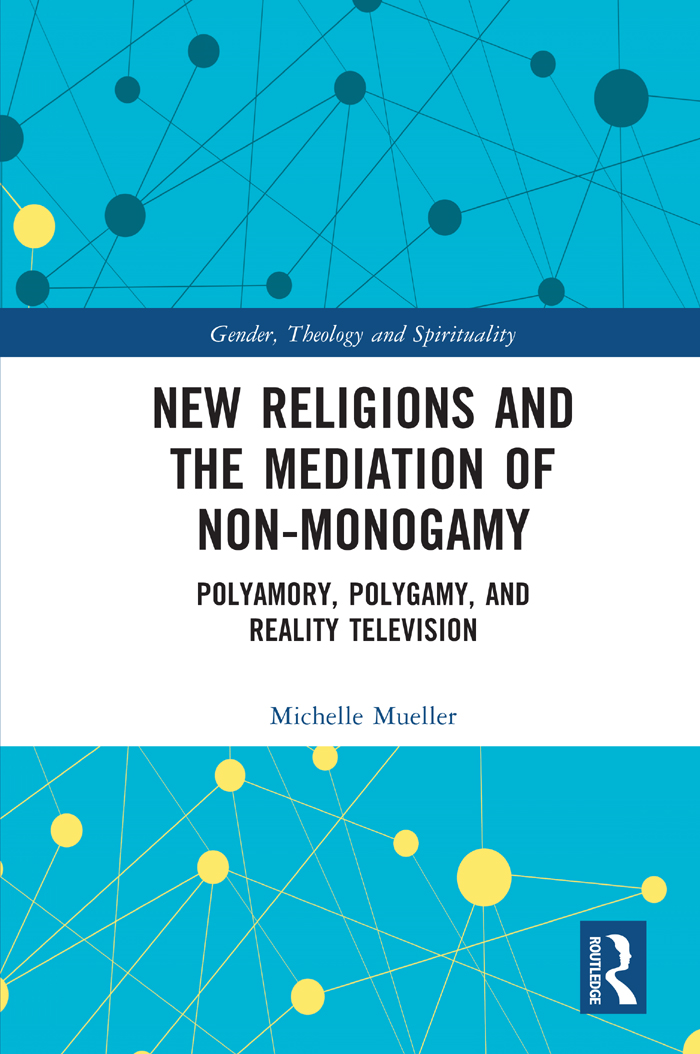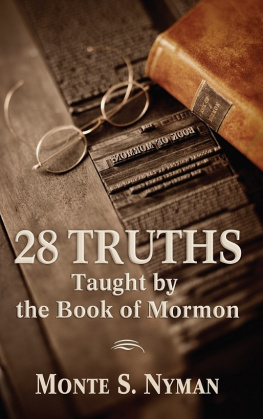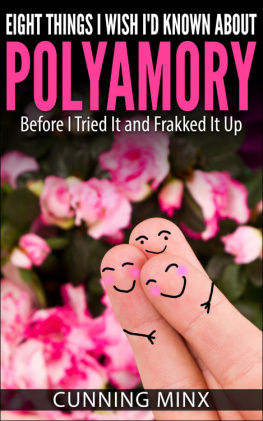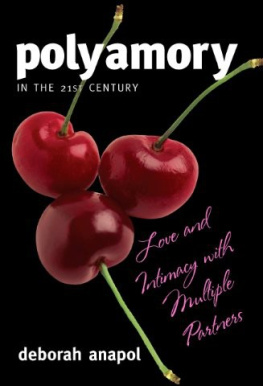
Contents
New Religions and the Mediation of Non-Monogamy
New Religions and the Mediation of Non-Monogamy examines the relation-ship between alternative American religions and the media representation of non-monogamies on reality-TV shows like Sister Wives, Seeking Sister Wife, and Polyamory: Married & Dating. The book is the first full-length study informed by fieldwork with Mormon polygamists and fieldwork with LGBTQ Neo-Pagan/Neo-Tantric polyamorists. The book tracks community members responses to the new media about them, their engagement with television and other media, and the likeness of representations to actual populations through fieldwork and interviews.
The book highlights differences in socioeconomic privileges that shape Mormon polygamists lives and LGBTQ polyamorists lives, respectively. The polyamory movement receives support from liberal media. As reality TV has shifted the image of Mormon polygamy to one of liberal American middle-class culture, Mormon polygamists have gained in public favor. The media landscape of non-monogamy is mediated by, in addition to these alternative religious populations, the norms and practices of the reality-TV industry and by sociocultural and economic realities, including race and class.
This book adds to the fields of media studies, critical race and gender studies, new religious movements, and queer studies.
Michelle Mueller teaches religion and ethnography, sociology of religion, and other courses at Santa Clara University. She is a faculty fellow of the colleges Center for the Arts and Humanities.
Gender, Theology and Spirituality
Series editor
Lisa Isherwood
University of Winchester, UK
Shame, the Church and the Regulation of Female Sexuality
Miryam Clough
Living Out Sexuality and Faith
Body Admissions of Malaysian Gay and Bisexual Men
Joseph N. Goh
The Spirituality of Anorexia
A Goddess Feminist Thealogy
Emma White
Religion, Feminism, and Idoloclasm
Being and Becoming in the Womens Liberation Movement
Melissa Raphael
Unlocking Orthodoxies for Inclusive Theologies
Queer Alternatives
Edited by Robert E. Shore-Goss and Joseph N. Goh
The Indecent Theologies of Marcella Althaus-Reid
Voices from Asia and Latin America
Edited by Lisa Isherwood and Hugo Crdova Quero
Contemporary Feminist Theologies
Power, Authority, Love
Edited by Kerrie Handasyde, Cathryn McKinney, and Rebekah Pryor
New Religions and the Mediation of Non-Monogamy
Polyamory, Polygamy, and Reality Television
Michelle Mueller
For more information and a full list of titles in the series, please visit: https://www.routledge.com/religion/series/GTS
New Religions and the Mediation of Non-Monogamy
Polyamory, Polygamy, and Reality Television
Michelle Mueller

First published 2022
by Routledge
2 Park Square, Milton Park, Abingdon, Oxon OX14 4RN
and by Routledge
605 Third Avenue, New York, NY 10158
Routledge is an imprint of the Taylor & Francis Group, an informa business
2022 Michelle Mueller
The right of Michelle Mueller to be identified as author of this work has been asserted by her in accordance with sections 77 and 78 of the Copyright, Designs and Patents Act 1988.
All rights reserved. No part of this book may be reprinted or reproduced or utilised in any form or by any electronic, mechanical, or other means, now known or hereafter invented, including photocopying and recording, or in any information storage or retrieval system, without permission in writing from the publishers.
Trademark notice: Product or corporate names may be trademarks or registered trademarks, and are used only for identification and explanation without intent to infringe.
British Library Cataloguing-in-Publication Data
A catalogue record for this book is available from the British Library
Library of Congress Cataloging-in-Publication Data
A catalog record has been requested for this book
ISBN: 978-0-367-18690-6 (hbk)
ISBN: 978-1-032-05167-3 (pbk)
ISBN: 978-0-429-19764-2 (ebk)
Typeset in Sabon
by MPS Limited, Dehradun
For the late High Priestess Judy Harrow and her Mormon neighbors.
What is remembered lives.
Contents
Interviewee 1: Are you LDS?
Author: No, Im not Mormon.
Interviewee 1: How did you get into this?
Author: Well, Im part of an alternative religious movement myself. And, my experience has led me to be both sympathetic to and curious about other religious minority populations.
Interviewee 1 (intrigued): Oh. Whats your religion?
Author: Im Wiccan.
INTERVIEWEE 1 nods and smiles, then pauses abruptly. I (the author) do not sense shock; rather, it seems the interviewee did not recognize the word.
Interviewee 1: Wait. Youre what?
Author: Im Wiccan. Its a new religious movement. It was founded in the 1950s in England. In your tradition, you have Heavenly Mother and Heavenly Father. We call them Goddess and God. Our values include honoring the earth as sacred and reducing harm wherever possible, much like your tradition encourages kindness and compassion and reverence for Gods creation.
Interviewee 2: Are you poly?
Author: I identify as poly-friendly and monogamous-by-choice presently. Im bisexual and I have been in poly relationships in the past. Also, Im part of the Pagan community, so polyamory is present in my social circle.
Interviewee 2: Why are you not poly now?
Author: Well, my current partner and I prefer monogamy; its what weve found works for us and what weve agreed on. Ive never felt like I was either monogamous or poly as a fixed orientation. Its more about what agreement I made with the person or people Im with.
Interviewee 2: So, monogamish?
Author: Kind of.
The above interview transcripts summarize my introductions within two research fields: the first within Utahs Mormon polygamist population, the second within a US polyamorous context. The question from informants in either population about my relation to the subject has become so expected that the dialogue has become, on my side, rehearsed and, on the others side, well, fairly uniform. The majority of researchers studying Mormon fundamentalism are Mormon; the majority of researchers studying polyamory are polyamorous. Like others, my academic interest in the subject began with my personal history, but I am neither polygamous nor polyamorous, nor any shade of Mormon for that matter. Yet, my interest in non-monogamy began during my undergraduate education at Bryn Mawr College. I was heavily involved in Philadelphias Wiccan/Pagan community, an alternative religious population that values ecological balance; sacredness of all living things; and emotional, intellectual, religious, and sexual freedom. I was exposed to polyamory, in concept and in practice, primarily through my Wiccan/Pagan mentors in Philadelphia. They were Gen Xers and Baby Boomers. They were in their 40s, 50s, and 60s and I, a Xillennial, was in my early 20s. As a young bisexual woman, I entered a few polyamorous relationships during and after college. My interest in Mormon polygamy and Mormon fundamentalism was part of a comparative gender studies inquiry, furthered by empathy and curiosity for new religious movements other than Wicca/Paganism.
Next page






